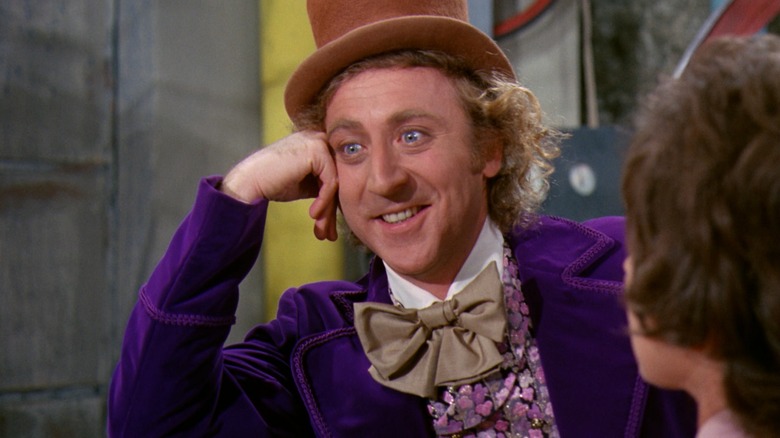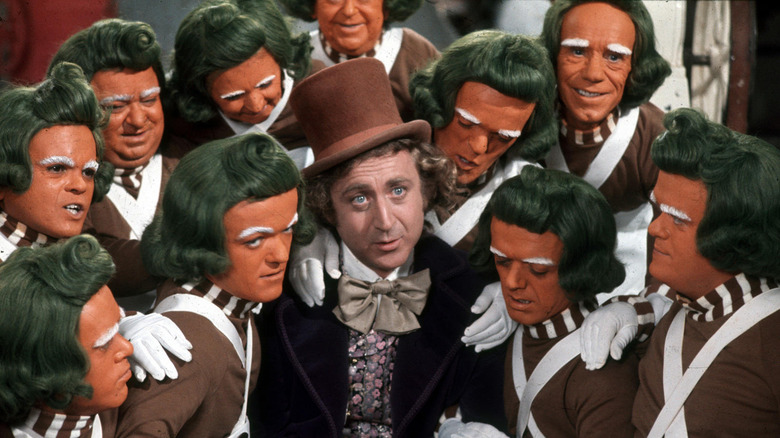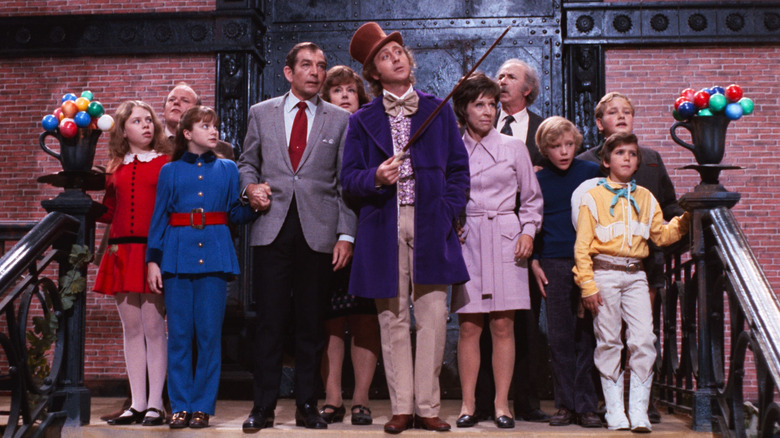Why Roald Dahl Absolutely Hated Gene Wilder's Willy Wonka
As most schoolchildren know, the novels of Roald Dahl are whimsical, delightful, and full of spite. Dahl's stories were rarely sentimental screeds about the magic of childhood, angling instead to describe how horrible kids have it. In most of Dahl's novels, adults are depicted as horrid and abusive, screaming at children and often physically harming them, all while the children live in poverty and destitution (see: "Matilda" especially, but also "James and the Giant Peach" and "The Witches"). Kids are only free once they stand up to the evil adults in their lives and find a way out of their miserable, Dickensian surroundings.
The films based on the works of Roald Dahl rarely capture the author's impeccable sense of childhood misery. The films, often made by American studios, tend to skew more traditionally "Hollywood," giving them happier endings, more action-packed scenes, and fewer moments of gentle, unusual whimsy. Naturally, Dahl disliked the films based on his books, mostly stemming from his overwhelming negative reaction to Mel Stuart's 1971 film "Willy Wonka and the Chocolate Factory," based on Dahl's 1964 novel, "Charlie and the Chocolate Factory." Stuart's film was something of a bomb when it came out, but was eventually rediscovered on home video, becoming a beloved classic to the children of the 1980s. Gene Wilder starred as Willy Wonka, and the famed comedian gave a notoriously unhinged performance as a kooky, reclusive chocolatier. After "Willy Wonka," Dahl became incredibly protective of his books, and typically refused to license them for adaptation during his lifetime (he died in 1990).
Dahl had several objections to "Willy Wonka," from the casting to the tone, feeling that Stuart wasn't doing his book justice. Thousands of kids may love the movie and it has become a classic for a whole generation, but you will not find Dahl as one of his celebrants. He would prefer that you just read his book instead.
Roald Dahl hated Gene Wilder as Willy Wonka
Firstly, Dahl hated that title change. His original book was about a young boy named Charlie who, thanks to a sweepstakes, is able to visit his town's mysterious candy factory, a place rarely seen by the outside world. The book follows him inside the factory where he meets its eccentric founder, and discovers the marvelous and magical means by which he makes chocolate. Charlie has to be on his best behavior, though, as the other children on the tour tend to be discarded or accidentally mutilated when they break the rules.
Mel Stuart's movie begins with Charlie (Peter Ostrum, now retired) and his peppy grandfather (Jack Albertson), but then abruptly shifts focus from Charlie to Willy Wonka once the chocolate tour begins. Gene Wilder upstages Charlie, and the bulk of the movie seems to be about him and his reaction to having kids in his factory. He's an imp who doles out punishment to naughty children, like a confectionary Krampus. Dahl, as has been reported many times over the years (including in the BBC), felt that Spike Milligan (of "The Goon Show") should have played Willy Wonka, as his comic sensibilities matched Dahl's vision of the character. Nothing doing. Wilder was the bigger American star, and the casting directors selected him instead.
Wilder, however, did give the character a sardonic quality that could be seen as the American interpretation of Willy Wonka's impishness.
Dahl also, according to his friend Donald Sturrock (quoted by Yahoo!), hated the film's music. He didn't like the new lyrics written and melodies written by Leslie Bricusse and Anthony Newley. It seems that he felt the songs were too saccharine; a strange accusation to be sure, seeing as the film was about candy.
Dahl was accused of racism
One of the conceits of both Dahl's book and Stuart's film is that Willy Wonka's factory is populated by Oompa-Loompas, a race of people from a fictional place called Loompaland. In Stuart's film, the Oompa-Loompas are all played by little-person actors (including the prolific Rusty Goffe), outfitted with orange skin and green hair. In the original book and in his screenplay for the movie, Dahl described the Oompa-Loompas as "pygmies from the deepest part of Africa." The "Darkest Africa" trope is a racist conceit left over from the previous generation's colonialist fiction, and Dahl gave no thoughts to what the Oompa-Loompas might look like to a modern audience. The NAACP came down on Dahl for his descriptions, and Dahl felt guilty. Of the racism accusations, Sturrock said:
"The objection to the title 'Charlie and the Chocolate Factory' is simply that the NAACP doesn't approve of the book, and therefore doesn't want the film to encourage sales of the book. [...] The solution is to make the Oompa-Loompas white and to make the film under a different title."
The version of the Oompa-Loompas in the movie — as orange-skinned, green-haired people — became so popular, Dahl actually went back and re-wrote his original text to more closely match them, hereby ridding himself of the racist tropes he originally leaned on.
In 1996, Dahl's widow, Felicity Dahl, gave an interview with the Los Angeles Times and recalled that her late husband also objected to the film's happy ending. The movie didn't quite end the same way as the book, being a cheery "You've won, Charlie!" narrative, rather than a "the mystery continues" adventure. Felicity confessed being baffled by the changed. Why, she wondered, would a Hollywood studio buy a book and then change it? Isn't the ending what drew Hollywood to the project in the first place?
Dahl's opinions never stuck, however, as the public came to love his movie anyway. After Dahl died, new films based on his work came rapidly, but one can only theorize about what he might have thought of them.


